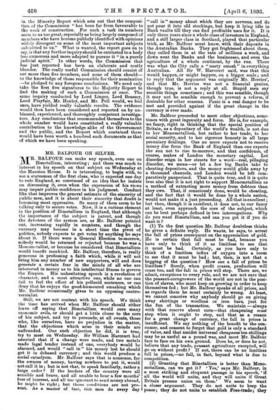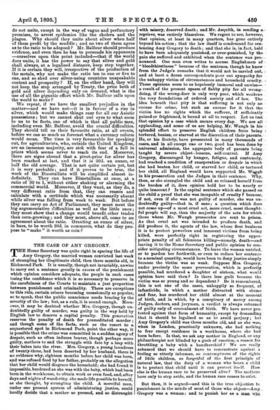MR. BALFOUR ON SILVER.
MR. BALFOUR can make any speech, even one on Bimetallism, interesting ; and there was much to interest in his speech on that subject on Wednesday at the Mansion House. It is interesting, to begin with, to see a statesman of the first class, who is expected one day to rule England, so convinced of an idea that he insists on discussing it, even when the expression of his views may impair public confidence in his judgment. Conduct like that improves the general estimate of the sincerity of public men, and it is about their sincerity that doubt is becoming most oppressive. So many of them seem to be talking only to secure votes. Now, it is a curious element in the position of Bimetallism in England, that although the importance of the subject is patent, and though the devotees of the system are, as Mr. Balfour pointed out, increasing rapidly in numbers, and though the currency may become in a short time the pivot of politics, nobody expects to get votes by anything he says about it. If there were a General Election to-morrow, nobody would be returned or rejected because he was a Monometallist, or because he considered that Bimetallism would benefit mankind. Mr. Balfour, therefore, is really generous in professing a faith which, while it will not bring him any number of new supporters, will and does generate a certain fear in the minds of all who are interested in money as to his intellectual fitness to govern the Empire. His unhesitating speech is a revelation of character, and a most attractive one, while no one can fail to feel the effect of his pellucid sentences, or can deny that he enjoys the good-humoured smashing which Mr. Balfour occasionally- gives to an opposing contro- versialist.
Still, we are not content with his speech. We think the time has arrived when Mr. Balfour should either leave off saying that Bimetallism would cure many economic evils, or should get a little closer to the core of his subject, and try to persuade, at all events, those who, like ourselves, have no prejudice in the matter, that the objections which arise in their minds are unfounded. One such objection he did, it is true, try to meet on Wednesday. Sir William Harcourt had asserted that if a change were made, and two metals made legal tender instead of one, everybody would be alarmed, and would "call in" his money lest he should get it in debased currency ; and this would produce a social cataclysm. Mr. Balfour says that is nonsense, for the owners of money, having nowhere to put it, would not call it in ; but is not that, to speak familiarly, rather a large order ? If the lenders of the country were all sensible and brave, and all unable to bear a few months' loss of interest, and all too ignorant to send money abroad, he might be right; but those conditions are not pre- sent. As a matter of fact, rich men do every day "call in" money about which they are nervous, and do not pour it into old stockings, but keep it lying idle in Bank vaults till they can find profitable uses for it. It is only three years since a whole class of investors in England, and a still larger class in Scotland, played that particular trick, as Mr. Balfour must know, with their deposits in the Australian Banks. They got frightened about them, they called them in at the rate of millions a week, and down went the Banks and the businesses, and even the agriculture of a whole continent, by the run. There was what the City calls a "nasty smash" in everything Australian. All Sir W. Harcourt said, was that this would happen, or might happen, on a bigger scale ; and to reply that the argument was originally Mr. Herries', and that Mr. Herries was not a financial genius, though true, is not a reply at all. Stupid men say sensible things sometimes ; and this was sensible, though it may not be sensible enough to prevent a reform, if desirable for other reasons. Panic is a real danger to be met and provided against if the great change in the currency is ever made.
Mr. Balfour proceeded to meet other objections, some- times with great ingenuity and force. He is, for example, we fancy, right in thinking that the special position of Britain, as a depositary of the world's wealth, is not due to her Monometallism, but rather to her trade, to her social security, and to her rigorous honesty in all large pecuniary dealings. One no more expects not to receive money due from the Bank of England than one expects the sun not to rise to-morrow, and that confidence, of course, makes of London the monetary capital. Let disorder reign in her streets for a week—real, pillaging disorder, we mean—or let a few big Banks take to cheating depositors, and the money would glide away by a thousand channels, and London would be left com- paratively pauperised. That is quite true, and it is quite true also that it is not right to support Monometallism as a method of extracting more money from debtors than they owe. That, if consciously done, would be cheating, and the fact that it would be done by a whole nation, would not make it a just proceeding. All that is excellent ; but then, though it is excellent, it does not, to our fancy at least, even approach the core of the subject, which can be best perhaps defined in two interrogations. Why do you want Bimetallism, and can you get it if you do want it ?
(1) To the first question Mr. Balfour doubtless thinks he gives a definite reply. He wants, he says, to arrest the fall of prices consequent on the appreciation of gold. He is certain that fall must be bad, because you have only to think of it as limitless to see that it must be bad. Certainly, as you have only to think of a limitless influx of oxygen into a room to see that it must be bad • but, then, is not that a begging of the question ? low can a fall of prices be limitless ? Surely, when profit ceases, production will cease too, and the fall in prices will stop. There are, we admit, exceptions to every rule, and we are not sure that the peasant-corngrowers of the world are not in the posi- tion of slaves, who must keep on growing in order to keep themselves fed ; but Mr. Balfour speaks of all prices, and as regards them he must certainly be wrong. At least, we cannot conceive why anybody should go on giving away shirtings or woollens or iron bars, just for the fun of the transaction. We maintain —always with that reserve about corn—that cheapening must stop when it ought to stop, and that as a reason for a great change of currency, the fall in prices is insufficient. We say nothing of the benefit to the con- sumer, and consent to forget that gold is only a standard of value, and that amidst universal cheapness ten shillings may be as useful as a pound was, and meet Mr. Balfour face to face on his own ground. Does he, or does he not, believe that any trade, peasant agriculture excepted, will go on without profit ? If not, there can be no limitless fall in prices,—no fall, in fact, beyond what is due to competition.
(2) Granting that Bimetallism is better than Mono- metallism, can we get it ? Yes,' says Mr. Balfour, in a most striking and eloquent passage in his speech, if all the world will unite, and they will unite if Great Britain presses union on them.' We seem to want a closer argument. They do not unite to keep the peace ; they do not unite to establish Free-trade; they
do not unite, except in the way of vague and perfunctory promises, to arrest epidemics like the cholera and the plague. Why should they unite about silver when half of them profit by the muddle ; and no two of them agree as to the ratio to be adopted ? Mr. Balfour should produce evidence, and even then he has to persuade his opponents —ourselves upon this point included—that if the world does unite, it has the power to say that silver and gold shall always, at a legalised distance, keep step together. If it is certain they will, irrespective of the production of the metals, why not make the ratio ten to one or five to one, and so shed over silver-using countries unspeakable content and prosperity If, on the other hand, they will not keep the step arranged by Treaty, the price both of gold and silver depending only on demand, what is the use of all the gigantic effort which Mr. Balfour calls upon the world to make ?
We repeat, if we have the smallest prejudice in the matter—and we have not—it is in favour of a rise in silver, which would make things easy for all our Asiatic possessions ; but we cannot shut our eyes to what seem to us to be facts, one of which is that all public men, including even Mr. Balfour, avoid the crucial difficulties. They should tell us their favourite ratio, at all events, before we can so much as forecast what a currency reform would mean. The time is very favourable for speaking out, for agriculturists, who, outside the United Kingdom, are an immense majority, are sick with fear of a fall in prices which seems never to reach its end. Moreover, there are signs abroad that a pivot-price for silver has been reached at last, and that it is 30d. an ounce, or half the old average. That is not quite certain yet, but it is very probable ; and if it proves to be true, the work of the Bintetallists will be simplified almost in- definitely. They can have Bimetallism at once, at a ratio of 30 to 1, without either shaking or alarming the commercial world. Moreover, if they want, as they do, a very different ratio from that, they can reason and calculate with a certitude which was necessarily absent while silver was falling from week to week. But before they can carry an Act of Parliament, they must meet the big argumentative difficulties as well as the little ones ; they must show that a change would benefit other trades than corn-growing ; and they must, above all, come to an agreement about the ratio. Granting an ounce of silver, in bars, to be worth 30d. in commerce, what do they pro- pose to " make " it worth as coin ?







































 Previous page
Previous page